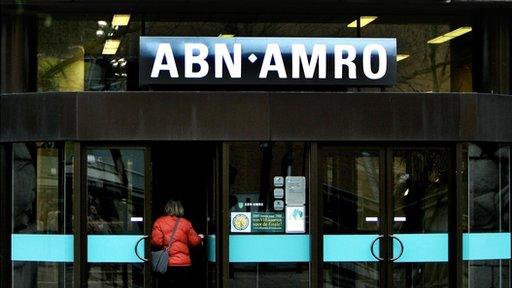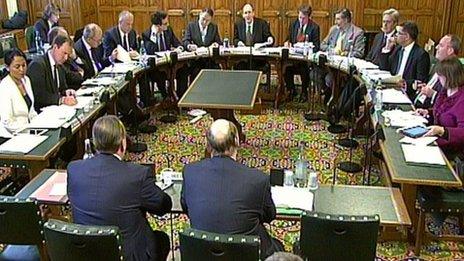How can we curb 'fat cat' bosses' pay?
- Published

The average chief executive trousered £4.5m in 2013 - more than 160 times the pay of the average Briton, and up 5% from 2012.
This research from the High Pay Centre, external is likely to put executive pay high up on the agenda during April's annual general meeting (AGM) season.
While exorbitant levels of pay at the top may stick in the craw of hard-pressed workers trying to cope with falling wages and job insecurity, it seems that even business leaders themselves are growing concerned.
A recent poll of Institute of Directors members found that more than half thought excessive pay packets were eroding people's trust in big companies.
Putting a lid on it
So how can we curb boardroom wage inflation?
Tim Bush of pension consultants Pirc says: "Whenever you try to create a fixed metric for pay, just like a tax system, people try to get around it…We need to get back to what's the least manipulable thing.
"Directors have legal duties, so fundamentally they should be lucky they are not sued for doing a bad job."
If taking bosses to court sounds a little drastic - and expensive - there are subtler forms of coercion.

Pride and money spur executives to demand higher pay, says Dame Alison Carnwath
AGMs are often noteworthy for rows about executive pay, with individual shareholders expressing displeasure at the latest eye-watering bonus scheme.
But most large companies' biggest shareholders are pension and mutual funds whose managers are "well paid themselves and sometimes more than CEOs [chief executive officers]," says Sir Mike Darrington, who ran baker Greggs from 1984 to 2008 and is now concerned about excessive boardroom pay.
"Therefore they are loath to take a stand. It would mean cutting off their noses as well."
That said, some activist shareholders have managed to curb excessive pay and some bosses do bow to public pressure.
For example, in December 2014 oil and gas giant BG Group revised the proposed pay package for its incoming chief executive, Helge Lund, after a shareholder revolt over his £12m upfront shares bonus.
And Ross McEwan, the boss of state-owned Royal Bank of Scotland, said in February he would forgo a share award worth £1m to stop it being "a distraction from the task of building a great bank".
'Trust democracy'
On the other hand, feisty WPP boss Sir Martin Sorrell this month defended his £36m share plan payout, external, saying it was "pay for performance" given that the advertising giant's market value had risen by £10bn over the plan's five-year period.
Prem Sikka, professor of accounting at the University of Essex, believes a wider group of people should have a say on pay, not just directors on "remuneration committees".
"We know we live in a world where profit matters, but the weight to which we attach profit could be diluted. Get employees and customers to vote on executive remuneration. If they are treating people well, all well and good.

WPP's Sir Martin Sorrell defended is £36m share pay out
"Trust forms of democracy."
Whether such radical change would happen voluntarily seems doubtful under current corporate governance structures, however.
'Salary hike'
So how did we get into this situation?
Sir Mike thinks bad practice set in when the state-owned utilities were privatised from the 80s onwards.
"The same people running [these companies] were given a big hike in salary. It was the same person doing the same job," he says.
In 1991, for instance, British Gas chairman Robert Evans came under fire, external for accepting a pay rise 10 times the rate of inflation.
Outrage at "fat cat bosses" began to grow.
The Greenbury report, external in 1995 sought to lay down a code of practice, recommending that a group of directors should set pay levels after taking "professional advice".
This had two consequences.
These directors on remuneration committees were always tempted to over-pay. "No one will thank you for losing a good chief by being mean," says Sir Mike.

In 1991, the chairman of British Gas came under fire for accepting a pay rise 10 times the rate of inflation
No remuneration committee wanted to appear as if it had chosen a worse candidate because it couldn't afford the better one.
And it boosted the role of pay consultants who tended to suggest that higher salaries and bonuses were necessary to attract and keep top personnel in a global market.
"The quantum just went up and up," says Sir Mike.
And when remuneration committees met, they would have to compare the pay packages of bosses at similar companies.
"If you were in oil, you saw what the chiefs in oil were paid. Suddenly, there was leapfrogging," he says.
Long-term incentives
Over the years, pay packages have become more convoluted as well.
Where once salary and a small bonus sufficed, a board-level executive can now expect a monthly pay cheque, an annual bonus and a long-term incentive plan, or LTIP.

Excessive boardroom pay is eroding trust in big companies, says the Institute of Directors
These LTIPs are usually paid in cash and shares and are triggered when longer-term performance targets are met.
While an annual bonus can double a director's salary, an LTIP can sextuple it.
"These long-term packages are often very complicated and are based on various performance measures over many years," says Dame Alison Carnwath, chairman of Land Securities and a previous chairman of the pay committee at Barclays.
The problem for shareholders deciding whether to approve an LTIP is that there can often be "no real confidence in what the payout will be", she says.
Escalating pay for bosses can also trigger wage inflation across the board, she warns.
Short shelf-life
From the CEO's point of view, life at the top is short, so the temptation to make hay is very strong, says Olly Watson, an executive at recruiter Page Group.

Some bosses have shorter top-flight careers than Premiership footballers
"To use a football analogy, you are not going to play for very long, so when you do, you have to earn as much as you can."
The boss of a FTSE 100 company only stays in the job four years on average, says David Ellis, head of reward at KPMG in the UK.
For Robert Kelsey, a writer on motivation, the problem is that money is the only yardstick bosses seem to be measured by.
However, not everything is about money and not everyone is motivated by it - but they are afraid to tell anyone, he believes.
"Companies should be very grown up about careers," he says.
For the moment, many people are trapped in a culture characterised by the "trite sales and marketing language seen in The Apprentice."

What is an LTIP?
A bonus based upon targets set for a number years, typically three to five
Often paid at least partly in shares
Favoured by some investors as they may focus a CEO's mind on the long-term health of a company
Reviled by others because targets, such as profitability, can be gamed by cost-cutting or aggressive accounting

- Published30 March 2015

- Published29 March 2015

- Published23 March 2015

- Published16 March 2015
